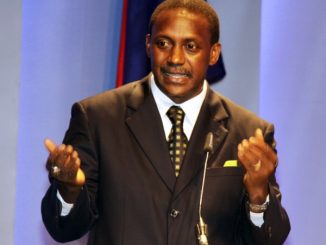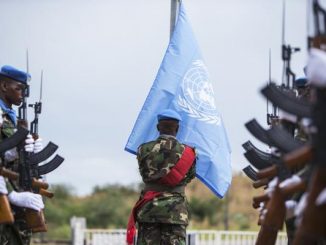
After providing approximately $300 million to support the Ebola emergency response in Sierra Leone in 2014 and 2015, the United States is again poised over the next two years to invest an additional $300 million in the country’s post-Ebola recovery and longer term development.
All U.S. activities support Sierra Leonean-owned plans and strategies and are closely coordinated with UN agencies and other international partners.
RESPONSE AND RECOVERY HIGHLIGHTS
The U.S. role in the emergency response has been robust, targeted, and timely; interventions included border monitoring and screening, construction of triage and isolation units, epidemiology and surveillance, infection prevention and control, emergency management, and rapid response.
The U.S. provided full-time technical support to the National Ebola Response Center. A private U.S. foundation provided $5.4 million to construct and fully equip a new Emergency Operations Center to manage the strategic needs of the response.
The U.S. Centers for Disease Control and Prevention (CDC) have provided critical scientific research and evidence-based inputs to the Ebola response. CDC technical expertise was instrumental in drafting the standard operating procedures that guided each pillar of the response. In collaboration with the Ministry of Health and Sanitation, the CDC established and maintained the database of all cases in the country.
Through USAID’s Office of Foreign Disaster Assistance, the U.S. supported five Ebola treatment units that treated more than 1,500 patients.
The U.S. funded, equipped, and staffed two labs that collectively processed over 37,000 samples, amounting to 35% of all samples tested during the Ebola outbreak.
The U.S. has been at the forefront of efforts to develop and deploy an Ebola vaccine and an Ebola therapeutic drug. To date, CDC has vaccinated nearly 8,000 high-risk, frontline healthcare workers through its vaccine trial in Sierra Leone.
USAID’s Food for Peace program is supporting the food needs of 1.5–2 million Ebola affected Sierra Leoneans, including children and survivors, through agricultural vouchers, cash transfers, in-kind food assistance, and contributions to UN regional emergency operations.
The U.S. will support a stronger, more resilient health care system in Sierra Leone. U.S. support will include the restoration of access to frontline mother child and health care centers throughout the country, replenishment of essential medicines and supplies, and technical assistance to build institutional capacity at the Ministry of Health and Sanitation.
CDC, in collaboration with the Ministry of Health and Sanitation and partners, will transition its Ebola response support to health systems strengthening—including establishing a National Public Health Institute, building public health workforce capacity, and enhancing Sierra Leone’s ability to prevent, detect, and respond to infectious disease outbreaks in the future under the aegis of the Global Health Security Agenda.
The Millennium Challenge Corporation is providing $44.4 million beginning in 2016 to help Sierra Leone improve the delivery of power and water for the people of greater Freetown.
USAID’s Feed the Future initiative will invest $6 million annually to improve the productivity of agricultural farming systems and value chains in ways that enhance nutrition and food security
- $600 million Estimated cumulative U.S. funding for Ebola response and post Ebola recovery efforts in Sierra Leone,
- 2014-2017 1,000 Number of U.S. CDC personnel deployed to Sierra Leone – the agency’s largest deployment ever
- 1,500 Number of patients treated at USG supported Ebola treatment units
- 7,000 Approximate number of health care workers trained in USG-supported infection prevention and control (IPC) programs
- 35% Percent of samples tested by U.S. laboratories during the outbreak
- 2 million Approximate number of Sierra Leoneans being reached by USG food assistance
Story adapted from the http://freetown.usembassy.gov/



